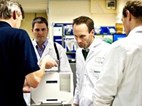Siemens Blood Gas Systems Set For Everest Return

The Xtreme Everest organisation is to use two blood gas analysers from Siemens Healthcare Diagnostics during a return expedition to Mount Everest later this year. The team of intensive care doctors, nurses and scientists conduct experiments at high altitude in order to develop therapies that improve survival rates amongst patients. Experimenting at altitude closely reflects the oxygen levels experienced by patients at intensive care units. The two systems from Siemens travelling to the world’s highest peak are the RAPIDPoint 500 Blood Gas Analyser and the RAPIDLab 348EX Blood Gas System. The Xtreme Everest 2 expedition follows previous research conducted on Everest by the organisation in 2007, which saw the team use the RAPIDLab 348 from Siemens.
The team will conduct studies into nitric oxide and its effect on microcirculation and mitochondria. Volunteers will include identical twins, children, Sherpas and some of the volunteers who took part in 2007. The RAPIDPoint 500 offers ease-of-use to deliver laboratory-quality results at the Point of Care in approximately 60 seconds from a single, whole blood sample. The system’s built-in CO-oximeter will be used by the team to investigate haemoglobin mass levels at high altitude. The RAPIDLab 348EX Blood Gas Analyser features a new colour touchscreen monitor for intuitive ease of use, supported by its predecessor’s tried and tested components for reliability and minimal maintenance requirements.
As part of the preparations, Siemens Healthcare Diagnostics’ manufacturing facility in Sudbury played host to members of the Xtreme Everest 2 team, and demonstrated the production of the RAPIDPoint 500 Blood Gas Analyser and RAPIDLab 348EX Blood Gas System. The visit by Dan Martin, Expedition Leader at Xtreme Everest and Honorary Consultant in Anaesthesia and Critical Care Medicine at the Royal Free Hospital in London and his team, is the latest event in a long-standing relationship with Siemens.
During the visit to the Siemens manufacturing facility, the Xtreme Everest team received a detailed explanation and demonstration of how the RAPIDPoint 500 and RAPIDLab 348EX systems are built at the factory. They also received hands-on experience across the production line, which allowed them to gain a greater understanding of the systems, as well as further insight into how the RAPIDPoint 500 and RAPIDLab 348EX can be maintained in the harsh environment of the Himalayas.
“Our second expedition to Everest with Siemens Healthcare Diagnostics systems will prove invaluable as we investigate how nitric oxide levels affect micro-circulation in the body,” states Dan Martin, Expedition Leader at Xtreme Everest and Honorary Consultant in Anaesthesia and Critical Care Medicine at the Royal Free Hospital. “The tour to Siemens Sudbury enabled us to gain valuable insight into the production of the sophisticated RAPIDPoint 500 Blood Gas Analyser. The system will play an important part in our experiments thanks to its in-built CO-oximeter for haemoglobin mass measurements. The RAPIDLab 348EX Blood Gas Analyser will be taken to the Himalayas for comparison with the standard 348 system ahead of its use in future expeditions to the region.”
“Siemens Healthcare Diagnostics has supported the Xtreme Everest organisation for more than six years, so we are thrilled the team will be using the RAPIDPoint 500 Blood Gas Analyser and RAPIDLab 348EX Blood Gas System on their return visit to Everest this year,” states Hilda Crockett, Regional Business Manager for Point of Care, North West Europe and UK, at Siemens Healthcare Diagnostics. “We were happy to give them a tour of our manufacturing facilities in Sudbury. The visit enabled them to see how the technology they are taking to the world’s tallest peak is produced. Both our analysers will help the team as they conduct high altitude experiments, supporting the development of techniques that aim to save vulnerable patients in intensive care.”
Source: Siemens plc
